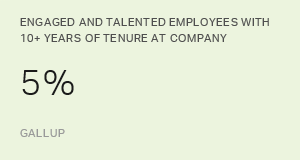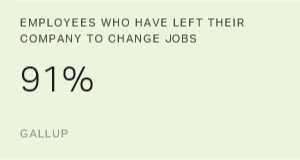This is the second article in a four-part series about engaging a remote workforce. Catch up on the first article.
For various reasons, you might hesitate to show genuine compassion for the people you lead, at least in the same way you would a family member or friend. Not demonstrating compassion can be problematic with remote employees who are especially at risk of feeling distant, if not isolated. But Gallup's research shows that compassionate managers can improve employees' performance.
In fact, Gallup's research from a survey of 10,000 people found that four qualities best describe leaders who inspire performance: trust, compassion, stability and hope. We talked about trust in the first article in this series. Now it's time to look at how compassion affects remote employees' engagement.
All workers need to feel that their manager genuinely cares. But having compassion is especially important for managers of remote workers.
When your team works remotely, opportunities to show you care only happen if you intentionally make them happen. But if you're not aware of the need to show compassion, lack the tools to demonstrate it or don't take the time to make it a priority, your remote workers might not feel that you genuinely care about them.
Not showing compassion for your remote employees can have a negative effect on your team's performance. Your concern -- or lack of -- affects performance outcomes in many ways.
In Gallup's Q12 engagement survey, we have asked millions of people to respond to item Q05. "My supervisor, or someone at work, seems to care about me as a person." Employees who agree with this item are more likely to:
- experiment with new ideas
- be advocates for their employer
- support coworkers personally and professionally
- feel equipped to strike a balance between their work and personal lives
Conversely, a perceived lack of compassion can have profoundly negative performance implications. Being physically distant, failing to notice facial expressions and other cues, or simply being too busy with your own work to maintain regular and intentional contact with your remote employees can all be interpreted as a lack of compassion. And failing to show you care can spell failure in your relationships with your remote employees.
To show compassion, you must learn about what matters most to each of your remote employees. And then pay attention to it. Ask questions about it. Remember names, events and milestones in people's lives. If you're not good at remembering details, make notes and refer to them before each check-in. Remote workers are people who want to know that you care about their lives inside and outside the workplace.
Darren, who manages remote web developers, learned about showing compassion the hard way. An employee requested time off, which he allowed. Months later, he asked her if she had enjoyed her vacation. She gave him a blank stare and walked away without a word. Another employee explained that she had requested time off to be with her son in the hospital after a serious accident -- not to take a vacation. Darren realized that he'd never made the time to demonstrate his concern for his people, which is why his employee didn't tell him about her family crisis -- he never gave her reason to believe he cared about her as a person. This moment taught Darren that managers have to intentionally reach out to employees because random opportunities to show compassion don't come up enough.
To show that you care about your remote workers and better understand how this positively affects your relationships with them:
- Give recognition or praise often (Q04). Employees want to do a good job, and they want you to notice their good work. Remote employees aren't around to participate in high-fives or receive thank you's in the hallway between meetings. Words of appreciation, texts and emails prove that you notice and appreciate their work. Be timely and specific with your praise or recognition.
- Ask for their opinions (Q07). Remote employees can offer a unique perspective because they're not entrenched in the ways of doing things "in the office." Take advantage of the unique environment in which your remote employees work by asking them what they think or what they'd recommend given a particular situation. You might be surprised at what they have thought about that you haven't.
Because 51% of employees say they would change jobs for one that offered them flextime and 37% would do the same for a job that offered them the ability to work where they want at least part of the time, the future of work will most likely be more employees working remotely some or all of the time. Honing your ability to show compassion will improve employees' performance and increase your value as a manager by making you one the best managers for the workplace of the future -- and the present.
Ask yourself the following five questions each week to sharpen your compassion skills:
- What have I done this week for my remote employees to make sure they know I care?
- In what ways am I tailoring how I show compassion to my remote employees so that they feel cared about in ways that matter to them?
- How can I ensure that I collaborate more often with my remote employees?
- How can I ask more often and tell less often?
- How will I continuously learn more about each remote employee's life outside the work environment?
The best managers avoid thinking they have all the answers. In fact, the best managers readily admit they don't have all the answers, and they know how to involve their employees to find the right answers together. Simply asking often and listening closely shows that you care.
Showing compassion isn't complicated. It is vital to your remote employees giving their best performance every day.
The third article in this series focuses on the importance of stability in engaging remote employees.
Learn more about how Gallup can help you engage remote employees:
- Download our State of the American Workplace report to get further insight into the performance needs of remote employees.
- Listen to our Managing Your Remote Workers webinar to hear what our experts have to say about the importance of communication in engaging remote employees.
- Inquire about our employee engagement solutions to find out how you can create a culture of engagement.
- Register for the Leading High-Performance Teams course to get the tools and techniques you need to develop and engage all employees, regardless of where they work.



